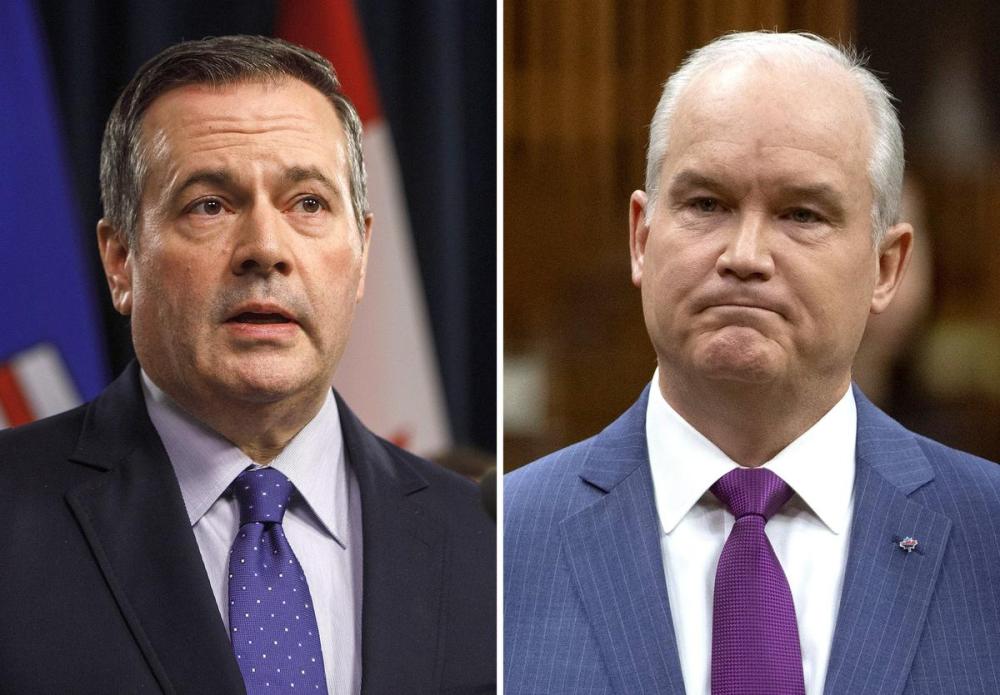Is O’Toole’s carbon tax the final nail in Kenney’s coffin?
Advertisement
Read this article for free:
or
Already have an account? Log in here »
To continue reading, please subscribe:
Monthly Digital Subscription
$1 per week for 24 weeks*
- Enjoy unlimited reading on winnipegfreepress.com
- Read the E-Edition, our digital replica newspaper
- Access News Break, our award-winning app
- Play interactive puzzles
*Billed as $4 plus GST every four weeks. Offer only available to new and qualified returning subscribers. Cancel any time.
Read unlimited articles for free today:
or
Already have an account? Log in here »
Hey there, time traveller!
This article was published 19/04/2021 (1415 days ago), so information in it may no longer be current.
It didn’t take long for Erin O’Toole to realize that if he didn’t step up and force Conservatives to reckon with climate change he and his party were doomed.
After all, it was less than a month ago that the majority of party delegates to a virtual policy conference voted against a motion to recognize climate change as real.
Much of that opposition came from delegates in Alberta and Saskatchewan. But now that O’Toole has reneged on the party’s strident opposition to the federal Liberals’ carbon tax and promised to establish a levy of his own if he should ever become prime minister, it’s obvious that certain core Conservative ideologies, and the party’s Western base, are being sacrificed in favour of voters in Quebec and Ontario.

Alberta premier Jason Kenney has also been thrown to the wolves.
This has to be the most embarrassing, humiliating, and infuriating point of his political career.
If you don’t live in Alberta, it’s hard to imagine just how much effort Kenney has put into fighting Justin Trudeau’s carbon tax. It was almost pathological; as if he just couldn’t help himself as he tore into Trudeau’s signature climate change initiative.
As leader of the UCP opposition, Kenney accused NDP Premier Rachel Notley of being a traitor to Alberta because her government introduced a carbon tax that met with the feds approval as part of its Climate Leadership Plan.
At one point, Kenney and Ontario premier Doug Ford railed against the carbon tax at a raucous rally in Calgary that attracted an overflow crowd of 1,500 people.
“The people of Ontario and Alberta are sick and tired of the tax-and-spend policies from this Trudeau government. My friend, Jason Kenney, and I have a united front when it comes to the worst tax ever, that’s the carbon tax,” said Ford.
Both Ford and Kenney have bigger problems now as their provinces record the highest rates of active COVID-19 cases in the country. As with climate change, they both seem to have difficulty reckoning with reality and science.
Scrapping the carbon tax and the NDP’s entire climate change strategy was central to Kenney’s campaign during the 2019 provincial election. And after Kenney’s UCP handily won that election, The Carbon Tax Repeal Act was its first piece of legislation.
Kenney was also central to the federal Conservatives’ platform when it came to climate change and the carbon tax. O’Toole kicked off his leadership campaign in Calgary, no doubt in order to seek Kenney’s favour. It worked; Kenney eventually endorsed O’Toole, a former cabinet colleague, instead of front-runner Peter MacKay.
“I have been impressed by his deep understanding of the challenges faced by the West and our energy industry,” Kenney said at the time.
After Kenney and other Conservative premiers fought the carbon tax all the way to the Supreme Court and lost, Kenney didn’t seem to know what to do next. He said he had anticipated that they would win so hadn’t come up with an alternate plan.
Another sign that he is at odds with reality.
Manitoba premier Brian Pallister had already talked about introducing a carbon tax and Saskatchewan Premier Scott Moe joined the club after the Supreme Court decision.
But Kenney has yet to reveal what he intends to do about it.
And he was just as unforthcoming when O’Toole recently announced his climate change platform, which includes a carbon tax, green savings accounts for individual consumers, regulations for industrial emitters, and investment in the manufacturing of electric vehicles.
Environment minister Jason Nixon was trotted out instead and said O’Toole’s climate change strategy would have to be studied so the government can figure out how it would impact the province’s economy.
Some conservative voters will drift to more right-wing political parties who still deny climate change and oppose a carbon tax. But Alberta and Saskatchewan have traditionally handed over such a plurality of votes to the federal Conservatives that they won’t likely be missed. The bigger danger for Kenney is that his UCP caucus may split over the issue.
Kenney’s credibility and competency have been shredded by someone he should have been able to count on as an ally.
Recovery seems a long way off.
Gillian Steward is a Calgary-based writer and freelance contributing columnist for the Star. Follow her on Twitter: @GillianSteward


